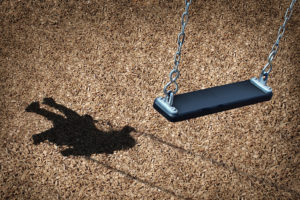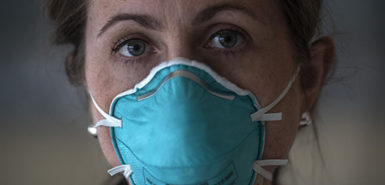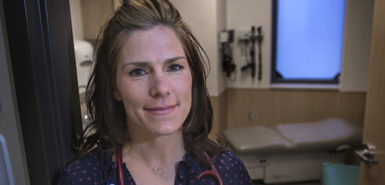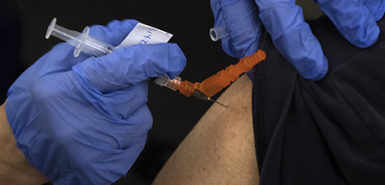
Sorry, kids.
Sorry, Mom and Dad.
Playdates should be off the table as we work to curb the spread of COVID-19, says a pediatric infectious disease specialist.
Rosemary Olivero, MD, understands your cabin fever.
A pediatric disease specialist for Spectrum Health Helen DeVos Children’s Hospital, she has three young children. And when their school closed, they embraced the novelty of staying home … at least for the first few days.
“Now they’re sad,” she said. “They miss their friends and their activities.”
But she is not arranging get-togethers with other kiddos—and she advises other parents to skip the playdates, as well.
It’s the socially responsible course to take, to help curb the spread of COVID-19 and protect those who are most vulnerable, Dr. Olivero said.
“Some new data shows that people can be infectious for a period of time before having typical symptoms of COVID,” she said. “So you or your children, who may be asymptomatic, can unintentionally expose their friends to the virus.”
And it’s possible your kids’ friends could transmit the virus to other family members—older adults and others at high risk for severe disease. And they, in turn, could expose others to the virus … and on and on.
“The difficulty is none of us really know the risk involved in doing small get-togethers,” she said. “There is such a cascading effect of exposing and infecting others. One infected person infects two to four others, and the number of people infected can become exponential.”
It’s a difficult concept to sell to some people, especially those who are not at high risk for severe disease due to the virus that causes COVID, she acknowledged.
But she considers the situation in Italy, where the government has ordered people to stay at home except for work and emergencies.
“We are trying to do all we can to limit the spread of the virus to the masses, so that we can protect those at highest risk. If we can do this, our hope is that our medical system will be able to provide the best care for those who do get the most severely ill from the virus.”
The situation could progress to that of what has become necessary in Italy, where the government has ordered people to stay at home except for work and emergencies.
“If the spread … gets more out of hand in the U.S., I can’t say that’s off the table,” Dr. Olivero said. “Obviously, we don’t want to get there. That’s why, in this era of being socially responsible, we have to limit the spread as much as we can—by scaling back as much as possible.”
Explain it to the kids
To help children understand our new era of social distancing, Dr. Olivero reminds them of times they were sick in the past, with a runny nose or a cough.
She talks about how germs cause illness—and how they spread.
“I tell them that some people might get much sicker from something that will maybe give you a mild cold,” Dr. Olivero said.
And she talks about ways she reduces the risk of spreading germs, including limiting time in public spaces such as grocery stores or pharmacies.
“We don’t touch anything we don’t need to. We use hand sanitizer and we wash our hands frequently when we cannot avoid a public space,” she said.
Activities, outdoor play
All that family togetherness can be challenging, Dr. Olivero acknowledged. Suddenly, parents juggle their work roles with their new duties as homeschool teachers.
But there are still plenty of rewarding activities that will keep kids occupied.
Play in your yard or take a walk in the woods. Incorporate daily walks or bike rides into the family schedule. Do chores outside.
“We’ve talked about building a tree house,” Dr. Olivero said.
Many schools provide daily lesson plans. And a number of online parenting sites offer crafts and fun activities for kids.
Parents can use FaceTime or Skype calls to connect kids with family members and friends.
As to babysitters for the children, Dr. Olivero advised caution.
She would avoid relying on a sitter who also cares for other families.
“If they are just babysitting for you and are not exposed to other people, that’s obviously favorable,” she said. “And make sure they are healthy. Steer clear if they have a fever or cough.”
Should grandparents babysit?
“I think if your extended family is in an isolated situation where you are very isolated from others and you’re confident you haven’t been exposed to others, you may feel OK with grandparents watching the kids,” she said. “But exercise caution. You could spread (the virus) to the grandparents, who may be at higher risk of severe COVID.”

 /a>
/a>
 /a>
/a>
 /a>
/a>
So it’s not advised to even let a few kids play outside together? What about going to a playground?
Please keep children six feet apart from one another… And sanitize/wash hands after they touch playground equipment…
I hate to be so frank, maybe even rude, but what part of “stay away from others” don’t you understand? “People” includes kids! They can so easily pass the virus on to mom & dad even. And nothing I’ve read about staying 6 feet away from each other says: oh, everybody but kids….
No, it is not worth the risk
Why are daycares still.opened then? I take my daycare kids to the park everyday that yhe weather permits. Exspecially now with have school aged kids in my care with schools closing.
My son has caught a sickness and can’t be tested. Just hoping he has regular flu and not gonna pass it to me. My immune system is compromised from heart failure. I really appreciate those who are working in at this time in the medical field. But not impressed with how the testing and procedure of all of it is going.
Best wishes to you and your son. Hope he gets better real soon.